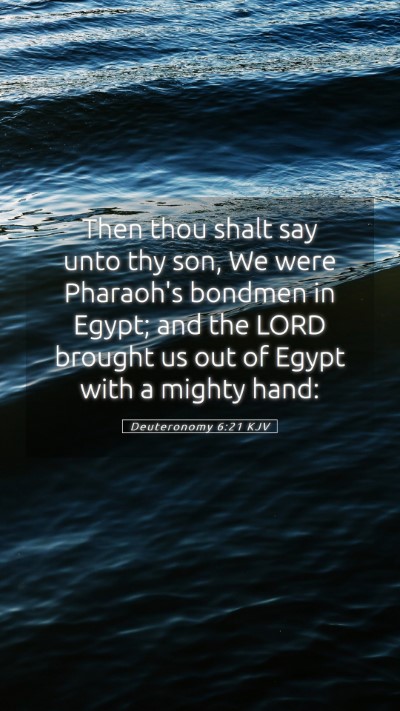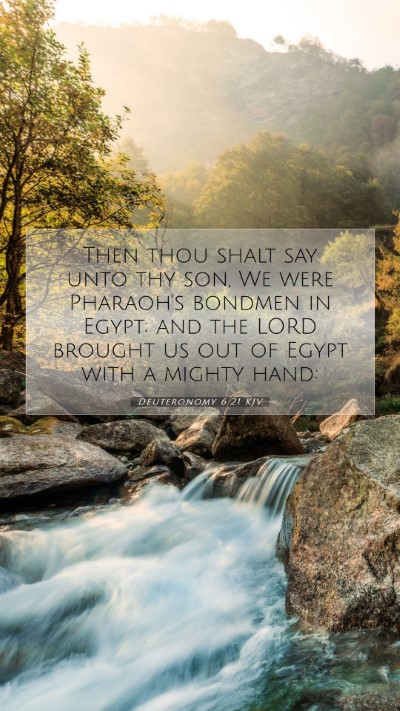Understanding Deuteronomy 6:21: A Comprehensive Bible Verse Commentary
Deuteronomy 6:21 reads: "Then you shall say to your son, ‘We were Pharaoh’s slaves in Egypt, and the LORD brought us out of Egypt with a mighty hand.’" This verse forms a part of the important discourse on the necessity of remembering and teaching the past, particularly God's deliverance of Israel from bondage.
This commentary draws upon insights from renowned public domain sources including Matthew Henry, Albert Barnes, and Adam Clarke. Through this analysis, we will explore the meaning of Bible verses and provide clarity on the Bible verse interpretations, deepening your Bible verse understanding and enhancing your Bible study insights.
Context and Significance
Deuteronomy, which means 'second law', encapsulates speeches made by Moses to the Israelites before they enter the Promised Land. The chapter establishes the foundation for understanding God’s covenant requirements as they settle in Canaan.
- Historical Context: The mention of Pharaoh and slavery highlights the Israelites' collective memory of suffering. By recalling this historical narrative, families are encouraged to pass down the significance of God's redemptive acts.
- Emphasis on Transmission: This verse emphasizes the duty of parents to inform their children about their heritage. This process of storytelling about salvation and deliverance is vital for fostering faith.
Verse Breakdown and Analysis
The verse can be broken down into several key themes:
1. Remembering Past Deliverance
According to Matthew Henry, the recollection of the Israelites' history serves as a powerful remembrance of God's saving acts. It reminds the faithful of their identity and encourages gratitude for God's mercy.
2. A Mighty Hand
Albert Barnes notes that the phrase "with a mighty hand" underscores the extraordinary nature of God’s intervention. This phrase serves to remind believers of God's omnipotence in freeing them, which contrasts their previous state of oppression.
3. Instruction to Future Generations
Adam Clarke emphasizes the necessity of effectively communicating these truths to future generations. The passing on of these narratives reinforces cultural and religious values within the community, ensuring that faith is alive and relevant.
Application of the Verse
Reflecting on Deuteronomy 6:21 encourages believers to consider how they share their spiritual heritage with others:
- Faith Sharing: Just as the Israelites were instructed to explain their history, modern believers should seize opportunities to share personal testimonies of faith and redemption.
- Building a Legacy: This instruction to instruct children cultivates a habit of open dialogues about faith, facilitating a legacy of belief and gratitude.
- Daily Reflection: By contemplating God’s past interventions in our lives, we can cultivate a spirit of gratitude and faithfulness.
Cross References
The message of Deuteronomy 6:21 resonates with several other scriptural passages, providing a richer understanding of its themes:
- Exodus 13:14-15: This passage emphasizes the importance of remembering the Exodus when teaching future generations.
- Psalm 78:4: This psalm encourages the recounting of God’s deeds to ensure that they are remembered by upcoming generations.
- Joshua 4:6-7: This narrative recounts the setting of stones as a memorial for Israel, reminding them of God’s deeds.
Conclusion
In conclusion, Deuteronomy 6:21 encourages an ongoing dialogue within families about the significance of deliverance and divine intervention. Through Bible verse commentary, this verse reveals the critical aspects of remembrance, gratitude, and teaching within the context of faith. As you delve into this understanding of Scripture, may it inspire you to engage in Bible study lessons that examine God’s work throughout history and allow those truths to infiltrate your everyday life.


